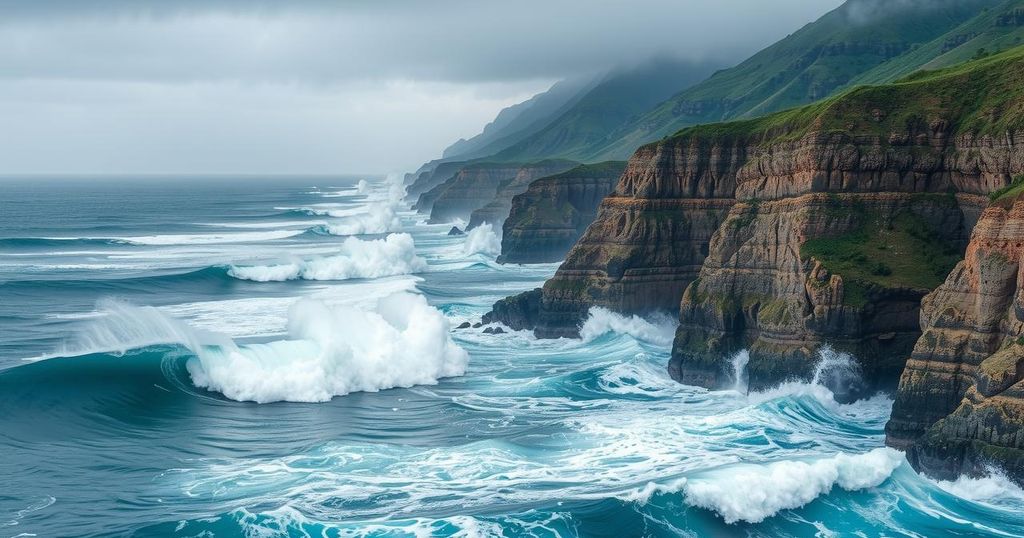Peru and Ecuador are facing unprecedented high waves causing severe coastal damage and fatalities. With wave heights reaching up to 13 feet, the governments have closed numerous seaports and issued warnings for public safety. The phenomenon is attributed to climate change, with experts cautioning ongoing impacts until at least January 4.
Officials in both Peru and Ecuador have issued urgent warnings for individuals to steer clear of coastal areas as unprecedented wave heights are causing significant damage to the coastline. This meteorological event emerged on Christmas Day and peaked on December 27 and 28, but is anticipated to persist until at least January 4. Reports indicate that wave heights have soared to an astonishing 13 feet (approximately 4 meters), severely affecting fishing communities and popular tourist regions, while leading to the inundation of areas such as Callao.
In an unprecedented response, the Peruvian government has closed approximately 100 out of 121 seaports, with the northern regions experiencing the most severe impacts. Visuals from the occurrence depict fishing vessels being tossed about violently. The Navy has executed multiple rescue operations, successfully aiding around 30 fishermen, though up to 180 remain stranded. A fishing community reported that over 100 boats have been lost during this calamity.
Navy Captain Enrique Varea cautioned that these unusually high waves could escalate further. Authorities project that waves may begin to moderate by the end of December, yet persisting conditions will likely continue to impact the coastlines through January 4. Civil Defense officials attributed this phenomenon to climate change, citing that strong winds originating from the United States compounded by abnormally high tides are responsible. They dismissed the suggestion of a freak wave or tsunami, instead identifying it as a sustained weather pattern linked to rising global temperatures.
The environmental crisis is compounded by the recent oil spill incident, impacting roughly 10,000 square meters of water and affecting at least seven beaches along Peru’s coast, alongside local wildlife. The usual influx of holiday tourism has been interrupted as coastal resorts face devastating losses, with reports indicating at least two fatalities in Ecuador and a body discovered on Chilean shores. Thus far, Peru has not confirmed any wave-related deaths.
The event impacting Peru and Ecuador is characterized by significantly heightened wave activity attributed to unusual climatic conditions. Strong winds and elevated tides, possibly linked to climate change, have resulted in waves exceeding three times their standard height, causing substantial damage along coastlines. These weather patterns have raised alarm among officials and residents alike, particularly as the holiday season, a time typically associated with bumper tourism in coastal regions, has been marred by these severe conditions. Furthermore, the recent oil spill adds another layer of environmental concern. As these dramatic weather changes are linked to broader climate shifts, experts anticipate continued repercussions for coastal regions, heightening the need for preparedness and resilience against future events. The existing conditions illustrate the pressing need for comprehensive climate action to mitigate future incidents and protect vulnerable coastal communities.
In conclusion, the unprecedented wave heights experienced along the coasts of Peru and Ecuador have resulted in significant environmental and human repercussions. With the government’s decisive actions, such as closing ports and issuing warnings, the focus remains on public safety and minimizing damage. The correlation between these extreme weather conditions and climate change calls for urgency in addressing the underlying issues that contribute to such catastrophic events. The recent oil spill adds to the mounting environmental concerns, emphasizing the need for sustainable practices to safeguard oceanic ecosystems.
Original Source: www.maritime-executive.com






